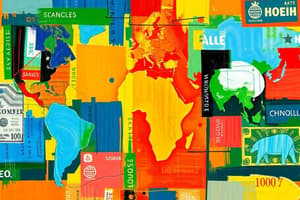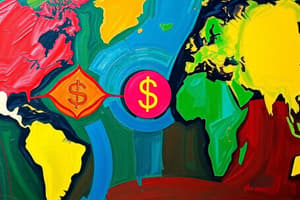Podcast
Questions and Answers
Quel impact positif la mondialisation financière a-t-elle eu sur les économies mondiales?
Quel impact positif la mondialisation financière a-t-elle eu sur les économies mondiales?
- Promotion de la convergence entre les économies développées et émergentes (correct)
- Réduction de l'efficacité des institutions financières
- Augmentation des coûts et des inefficacités
- Augmentation des inégalités de revenus
Quel pays a vu une augmentation significative de son économie orientée vers l'exportation après son adhésion à l'Organisation mondiale du commerce en 2001?
Quel pays a vu une augmentation significative de son économie orientée vers l'exportation après son adhésion à l'Organisation mondiale du commerce en 2001?
- Brésil
- Chine (correct)
- Afrique du Sud
- Inde
Quel aspect de la mondialisation financière a été critiqué pour avoir exacerbé les inégalités de revenus?
Quel aspect de la mondialisation financière a été critiqué pour avoir exacerbé les inégalités de revenus?
- Promotion de la concurrence entre les institutions financières
- Facilitation du flux de capital
- Réduction des écarts de taux d'intérêt
- Augmentation de l'inégalité de revenus (correct)
Quel est l'un des principaux défis liés à la mondialisation financière selon le texte?
Quel est l'un des principaux défis liés à la mondialisation financière selon le texte?
Quel est l'impact négatif potentiel de la mondialisation financière selon le texte?
Quel est l'impact négatif potentiel de la mondialisation financière selon le texte?
Qu'est-ce qui est susceptible de jouer un rôle significatif dans la mondialisation financière future selon le texte?
Qu'est-ce qui est susceptible de jouer un rôle significatif dans la mondialisation financière future selon le texte?
Qu'est-ce que la mondialisation financière englobe principalement?
Qu'est-ce que la mondialisation financière englobe principalement?
Quand la mondialisation financière a-t-elle réellement commencé selon le texte?
Quand la mondialisation financière a-t-elle réellement commencé selon le texte?
Quelle institution mondiale a été créée pour promouvoir la coopération économique entre les nations après la Seconde Guerre Mondiale?
Quelle institution mondiale a été créée pour promouvoir la coopération économique entre les nations après la Seconde Guerre Mondiale?
Qu'est-ce qui a encouragé la coopération économique entre les nations à travers des taux de change fixes à l'époque de l'Accord de Bretton Woods en 1944?
Qu'est-ce qui a encouragé la coopération économique entre les nations à travers des taux de change fixes à l'époque de l'Accord de Bretton Woods en 1944?
Quel changement majeur a été observé dans les pratiques bancaires avec l'avènement de la mondialisation financière post-Guerre Froide?
Quel changement majeur a été observé dans les pratiques bancaires avec l'avènement de la mondialisation financière post-Guerre Froide?
Quel événement historique a marqué un déplacement vers une mondialisation accrue et une déréglementation des mouvements de capitaux?
Quel événement historique a marqué un déplacement vers une mondialisation accrue et une déréglementation des mouvements de capitaux?
Study Notes
Financial globalization refers to the process of increasing international trade and investment, which has led to significant changes in financial markets worldwide. This trend began in earnest with the end of the Cold War and culminated in 1995 when all countries except North Korea joined the World Trade Organization.
The following sections discuss the historical background of financial globalization, its economic impact, challenges faced by financial globalization, and potential future developments in the field.
Historical Background
Financial globalization started as early as the 17th century when European powers established trading posts around the world. However, it was during the post-World War II period that global institutions like the International Monetary Fund (IMF) were set up, creating a framework for economic cooperation between nations.
In the mid-20th century, developed economies experienced rapid industrial growth, leading to increasing trade among countries. As a result, international financial markets expanded rapidly. The Bretton Woods Agreement in 1944 further encouraged economic cooperation between nations through fixed exchange rates.
However, after the end of the Cold War, there was a shift towards increased globalization and deregulation of capital movements, allowing for greater cross-border investments and trading activities. This period saw significant changes in banking practices with the rise of international banks operating across borders.
Economic Impact
Financial globalization has had several positive impacts on economies worldwide. It has led to an increase in foreign direct investment (FDI), which has boosted economic growth in developing countries. For example, China's entry into the World Trade Organization in 2001 significantly boosted its export-oriented economy.
Additionally, financial globalization has facilitated the flow of capital around the world, reducing interest rate spreads and promoting convergence between developed and emerging market economies. It has also led to increased competition among financial institutions, driving down costs and improving efficiency.
Despite these benefits, financial globalization has faced criticism due to its potential negative effects such as exacerbating income inequality within and between countries. It has also been blamed for causing financial crises due to the interconnectedness of global financial markets.
Challenges and Criticisms
One of the main criticisms of financial globalization is that it has led to the emergence of a global financial crisis, such as the 2008 recession, as interconnected financial markets amplify shocks. Additionally, financial globalization has been criticized for promoting income inequality within and between countries.
There are also concerns about the loss of sovereignty in financial matters due to global institutions like the IMF and the World Bank, which have imposed financial conditionality on their borrowers. This has led some countries to pursue protectionist policies to safeguard their economies.
Future Developments
Despite these challenges, financial globalization is expected to continue, given the need for international cooperation in addressing pressing global issues like climate change and pandemics. In the future, digital technologies are likely to play a significant role in financial globalization, enabling more efficient cross-border transactions and reducing transaction costs.
However, the future of financial globalization will depend on how these challenges are addressed, and whether countries can find a balance between global cooperation and national sovereignty.
In conclusion, financial globalization has had significant impacts on the global economy, both positive and negative. While it has facilitated increased trade and investment, it has also faced criticisms for exacerbating income inequality and causing financial crises. The future of financial globalization will depend on how these challenges are addressed and how countries balance global cooperation with national sovereignty.
Studying That Suits You
Use AI to generate personalized quizzes and flashcards to suit your learning preferences.
Description
Explore the historical background, economic impact, challenges, and potential future developments of financial globalization. Learn about the process of increasing international trade and investment that has shaped financial markets worldwide.




